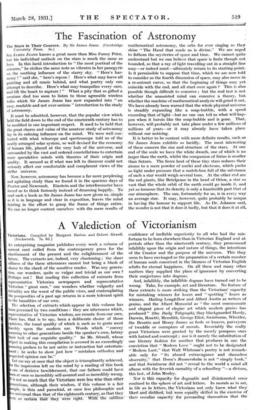The Fascination of Astronomy
By Sir James Jeans. (Cambridge The Stars in Their Courses.
University Press. 584 SIR JAMES JEANS knows a great more than Miss Fanny Price, but his individual outlook on the stars is much the same as hers. In this lucid introduction to "_the most poetical of the sciences," he strikes the same note as vibrates in her panegyric on the soothing influence of the starry sky. "Here's har- mony ! " said she, "here's repose! Here's what may leave all painting and all music behind, and what poetry only can attempt to describe. Here's what may tranquilize every care, and lift the heart to rapture ! " What a pity that so gifted a creature died too soon to listen to those agreeable wireless talks which Sir James Jeans has now expanded into "an easy, readable and not over-serious " introduction to the study. of astronomy.
It must be admitted, however, that the popular view which- held the field down to the end of the nineteenth century has to be modified in one important respect. It used to be held that the great charm and value of the amateur study of astronomy. lay in its calming influence on the mind. We were well con- tented with what telescope and spectroscope told us of the neatly arranged solar system, so well devised for the economy of human life, placed at the very hub of the universe, and surrounded by the vast and ordered constellations to entertain more speculative minds with theories of their origin and quality. It seemed as if what was left to discover could not seriously affeet our comfortable and complacent views of the stellar universe.
Now, however, astronomy has become a far more perplexing and agitating study than we found it in the spacious days of Proctor and Newcomb. Einstein and the interferometer have forced us to think furiously instead of dreaming happily. To read such a book as Sir James Jeans has now given us, simple as it is in language and clear in exposition, leaves the mind fainting in the effort to grasp the frame of things entire. We can no longer content ourselves with the mere results of
mathematical astronomy, the orbs for ever singing as they shine "The Hand that made us is divine." We are urged to fathom the mysteries of space and time. We cannot quite understand but we can believe that space is finite though not bounded, so that a ray of-light travelling out in a straight line may—or indeed must—ultimately return to its starting-point.. Is it permissible to suppose that time, which we are now told. to consider as the fourth dimension of space, may also move in) a re-entrant curve, so that the beginning of things may yet coincide with the end, and all start over again ? This is also. possible though difficult to conceive ; but the real test is not whether the unassisted mind can conceive a theory, but whether the machine of mathematical analysis will grind it out. We have already been warned that the whole physical universe is steadily expanding like a soap-bubble, with a speed exceeding that of light—but no one can tell us what will hap- pen when it bursts like the soap-bubble and is gone. That, however, will probably not take place under a few millions of millions of years—or it may already have taken place without our noticing.
It is better to be content with more definite results, such as Sir James Jeans exhibits so lucidly. The most interesting. of these concern the size and structure of the stars. At one end of the scale we have the white dwarfs, one of which is no larger than the earth, whilst the companion of Sirius is smaller than Saturn. The fierce heat of these tiny stars reduces their atoms to a mere powder of nuclei and electrons, which packs. so tight under pressure that a match-box full of the substance of such a star would weigh several tons. At the other end are the red giants, like Betelgeuse in the head of Orion, a star so vast that the whole orbit of the earth could go inside it, and yet so tenuous that its density is only a hundredth part that of our atmosphere. The sun, fortunately for us, is in every way an average star. It may, however, quite probably be unique in having the honour to support life. As Dr. Johnson said, the wonder is not that it does it badly, but that it does it at all.














































 Previous page
Previous page